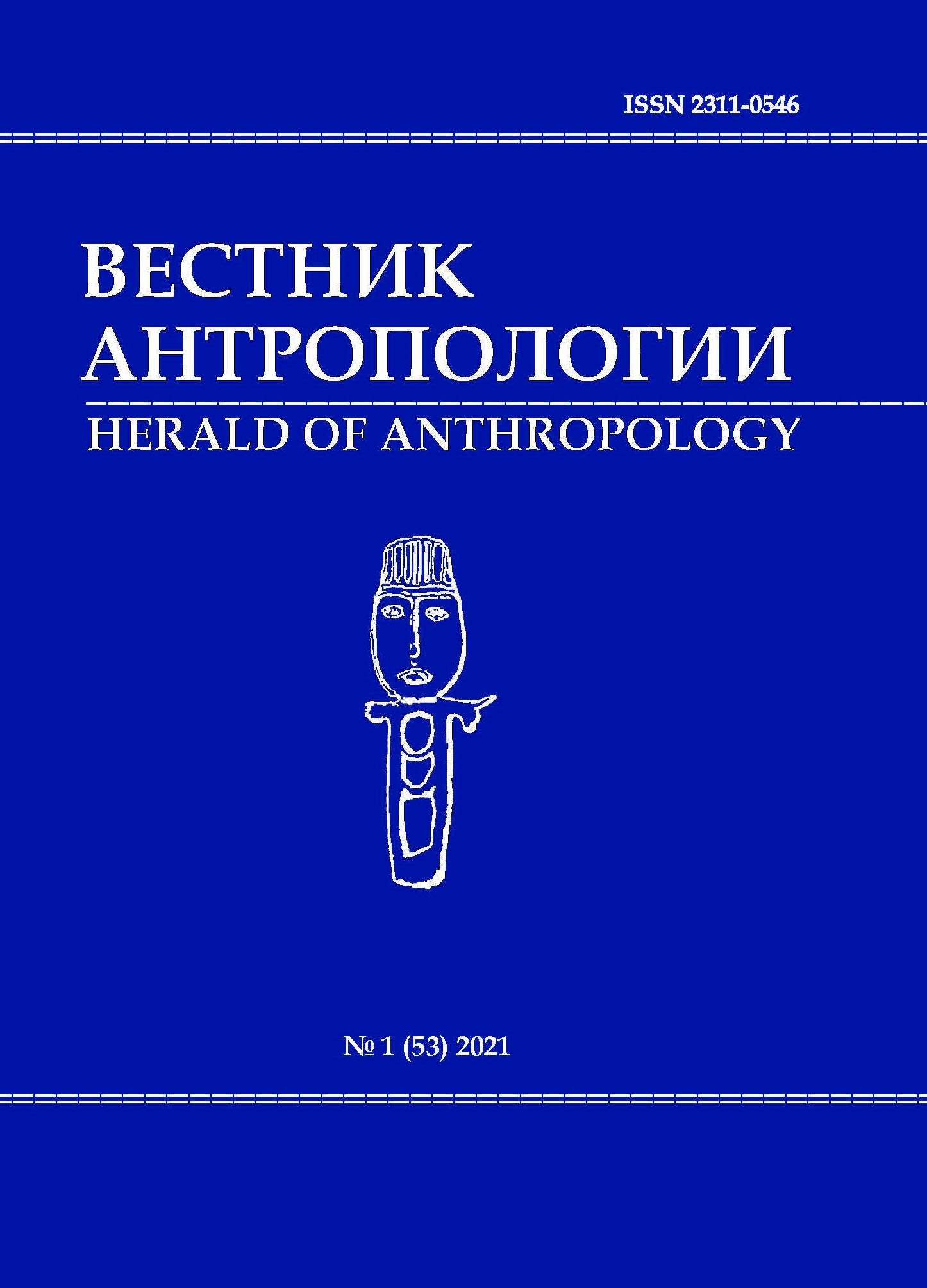Bilingualism of the Russian Germans (According to the Sociological Surveys)
DOI: 10.33876/2311-0546/2021-53-1/149-165
Keywords:
bilingualism, Russian Germans, ethno-lingual processes, sociological surveyAbstract
Various factors impact on lingual processes of the Russian Germans. They are: heterogeneity of ethnic community, dispersed type of settlement for the most Germans and, at the same time, preserving the areas of dense settling in rural parts of the country. Other factors include: varying understanding of the “mother tongue” category and increasingly growing role of non-governmental organizations of the Russian Germans that pursue a goal-oriented policy dedicated to identity protection and maintenance of the German language. Affected by these factors the language of the Russian Germans experienced significant transformations. The Russian-German bilingualism, as a specific trait of lingual situation of the Germans living in Russia, obtained new forms. The German language gradually lost its practical functions and is increasingly turning into an ethnical symbol. The Russian language has become, on the other hand, a general tool of commonplace communication. The choice of language (German or Russian) for communication ended up depending on a particular situation, lingual environment, professional sphere and participation in non-governmental organizations’ activity. In order to trace the dynamics of lingual processes the method of sociological surveys was applied. The method provides an opportunity to study peoples living in lingual borderland more thoroughly. Surveys of the Germans are being held by The International union of German culture once in ten years. The article provides insight into the results of the last two large-scale surveys that were conducted in 2009 and 2020. Their common goal was to analyze the state and trends of ethnocultural development of the Russian Germans. The separate module of questions mentioned in the article was dedicated to the language of the Russian Germans. The authors focused on such factors as mother tongue recognition, level of proficiency in one or another language, the field and forms of languages’ usage and assessment of teaching German in educational institutions. Dynamic of ethno-lingual processes revealed in the article provides an insight into the lingual situation and an outlook to the development of Russian-German bilingualism of the Russian Germans.
For Citation: Smirnova, T.B. and E.A. Shlegel. 2021. Bilingualism of the Russian Germans (According to the Sociological Surveys). Herald of Anthropology (Vestnik Antropologii) 1 (53): 149–165.
References
- Aleksandrov, O.A., Bogoslovskaya, Z.M. 2008. Nemetskii “Ostrovnoi” govor Tomskoi oblasti [German “Island” mode of speech of the Tomsk Region]. Tomsk: Izdatel’stvo TPU.
- Baikova, O.V. 2012. Funktsionirovanie nemetskikh dialektov v usloviyakh mezh- i vnutriyazykovogo vzaimodeistviya v ramkakh yazykovogo ostrova (teoreticheskie problemy i polevye issledovaniya v Kirovskoi oblasti) [Functioning of German dialects within the conditions of inter- and intralingual flow of communication as part of lingual island (theoretical problems and field studies in the Kirov Region)]. Doctoral (Philology) Dissertation, Nizhny Novgorod: Linguistics University of Nizhny Novgorod.
- Dinges, G.G. 1925. K izucheniyu govorov Povolzhskikh nemtsev (Rezul’taty, zadachi, metody) [To the mode of speech of the Germans along the Volga (Results, goals, methods)]. Uchenye zapiski SGU [Scientific Notes of Saratov State University] 4 (3): 299–313.
- Dulzon, A.P. 1941. Problemy skreshcheniya dialektov po materialam yazyka nemtsev Povolzh’ya [Problems of hybridization of the dialects accoding to the lingual materials of the Germans along the Volga]. Izvestiya Akademii nauk Soyuza SSR. Otdelenie literatury i yazyka [Proceedings of the Academy of Sciences of USSR. Section of literature and language] 3: 82–96.
- Dyatlova, V.A. 1988. Tendentsii razvitiya morfologicheskogo stroya kontaktiruyushchikh verkhnenemetskikh dialektov v usloviyakh inoyazychnogo okruzheniya [Tendencies of development for morphological base of connecting High German dialects under the conditions of foreign-language environment]. Extended Abstract of Candidate (Philology) Dissertation, Leningrad: Izdatel’stvo LenGU.
- Zhirmunski, V.M. 1956. Nemetskaya dialektologiya [German dialectology]. Moscow-Leningrad: Akademiya nauk USSR.
- Libert, E.A. 2019. Pis’mennost’ yazyka mennonitov Plautdietsch [Writing system of Mennonite language Plautdietsch]. Vestnik NGU [Novosibirsk State University Bulletin] 17 (3): 32–41. Doi: 10.25205/1818-7935-2019-17-3-32-41.
- Minor, A.Ya., S.I. Zamogil’nyi, and L.I. Tetyueva, eds. 2014. Dialekt Ekaterinenshtadta: istoki i razvitie [Dialect of Yekaterinenstadt: sources and development]. Saratov: Izdatel’stvo Saratovskii istochnik.
- Minor, A.Ya., L.I. Tetyueva, eds. 2016. Itogi razvitiya variantov povolzhskikh nemtsev v pervoi polovine XX veka [Development results of lingual variations of the Germans along the Volga in the first half of XX century]. Saratov: Izdatel’stvo Saratovskii istochnik.
- Moskalyuk, L.I. 2002. Nemetskie dialekty na Altae [German dialects in Altai]. Doctoral (Philology) Dissertation, Barnaul, Izdatel’stvo Barnaul GPU.
- Smirnova, T.B., Kisser, T.S. 2017. Mnogoobrazie nemtsev Rossii [Diversification of Russian Germans]. Ural’skij istoricheskij vestnik 2 (55): 44–53.
- Smirnova, T.B. 2010. Results of ethno-sociological survey questionnaire and monitoring of non-governmental organizations of Russian Germans. Nemtsy novoi Rossii: problemy i perspektivy razvitiya. Proceedings of the Second International Research-to-Practice Conference “Germans of contemporary Russia: problems and perspectives of development” (Moscow, Russia, September 7–9, 2009), edited by A.A. German, 6–59. Moscow: MSNK-press.
- Smirnova, T.B. 2015. Etnosotsiologicheskii monitoring yazykovykh protsessov i yazykovoi raboty [Ethno-sociological monitoring of lingual processes and lingual work]. BiZ-Bote 2: 24–29.
- Frolova, N.A. 1999. Spetsifika razvitiya ostrovnykh govorov v usloviyakh nemetsko-russkogo bilingvizma: na materiale govorov derevni Gebel’ Kamyshinskogo raiona Volgogradskoi oblasti [Specifics of development of island modes of speech in the setting of the German-Russian bilingualism: a case study of modes of speech in the village Gebel’ of Kamyshinskii district of the Volgograd Region] Candidate (History) Dissertation, Saratov, Izdatel’stvo SGU.
- Berend, N. 2011. Russlanddeutsches Dialektbuch: die Herkunft, Entstehung und Vielfalt einer ehemals blühenden Sprachlandschaft weit außerhalb des geschlossenen deutschen Sprachgebiets. Halle: Projekte-Verlag. Cornelius.





















